From Root to Remedy: How Beets Boost Your Health Naturally
Published: April 2, 2025 at 4:40:47 PM UTC
Last updated: January 2, 2026 at 5:52:28 PM UTC
Beets are not just a tasty addition to your meals. They are also full of health benefits. Known as superfoods, beets are low in calories but high in vitamins, minerals, and antioxidants. This makes them great for boosting your health. Whether you eat them raw, roasted, or juiced, beets can greatly improve your wellbeing. They add color and flavor to your diet while providing essential nutrients.
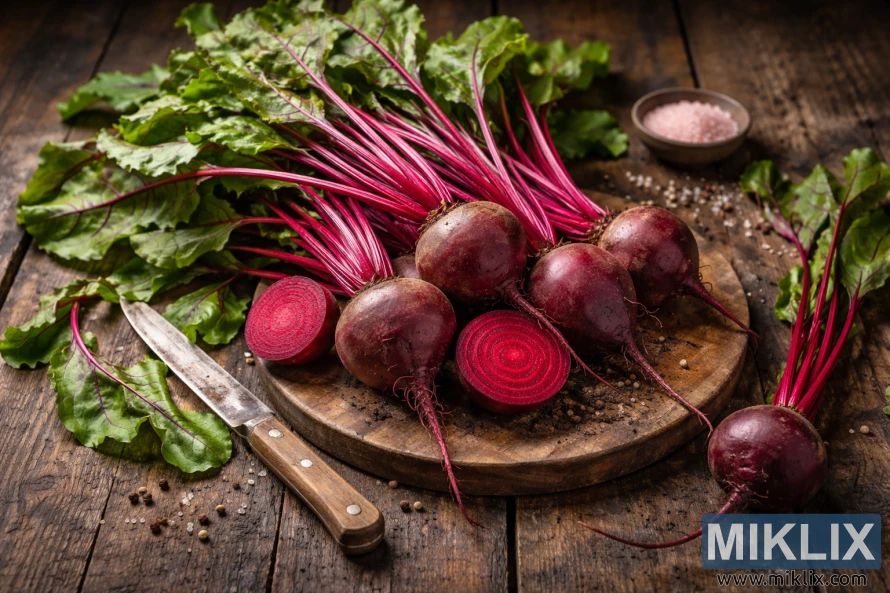
Key Takeaways
- Beets are rich in essential vitamins and minerals.
- The nutritional value of beets supports overall health.
- Eating beets can help maintain a healthy blood pressure.
- Beets enhance athletic performance due to their natural compounds.
- They may assist in reducing inflammation in the body.
- Beets contribute to improved digestive health thanks to their fiber content.
Introduction to Beets and Their Nutritional Value
Beets, also known as Beta vulgaris, are packed with nutrients. They are a key part of many healthy diets. Beets are rich in vitamins and minerals, making them a superfood.
Beets are low in calories, with only about 44 calories per 100 grams. This makes them a great choice for those watching their calorie intake.
These nutrients not only add flavor to dishes but also offer health benefits. You can enjoy beets in salads, juices, or soups. Their versatility makes them a great addition to any meal.
Loaded with Essential Vitamins and Minerals
Beets are packed with vitamins and minerals, making them great for your diet. They have a high nutrient density, providing health benefits without extra calories. For example, beets have folate, giving you a significant part of your daily needs. This vitamin is key for cell growth and heart health.
Beets also offer other important nutrients. The minerals in beets include:
- Manganese: Supporting bone health and metabolism.
- Potassium: Important for fluid balance and muscle function.
- Copper: Needed for iron absorption and energy.
The vitamins and minerals in beets make them appealing. They add flavor and a boost of nutrients to your meals. Adding beets to your diet can improve your health in many ways.
Could Help Keep Your Blood Pressure in Check
Beets are now seen as a superfood, great for blood pressure. They have lots of nitrates, which help your heart. When you eat beets, your body turns these nitrates into nitric oxide.
Nitric oxide makes your blood vessels relax. This can lower your blood pressure. Adding beets to your diet can be good for your heart. Eating beets often might help keep your blood pressure down.
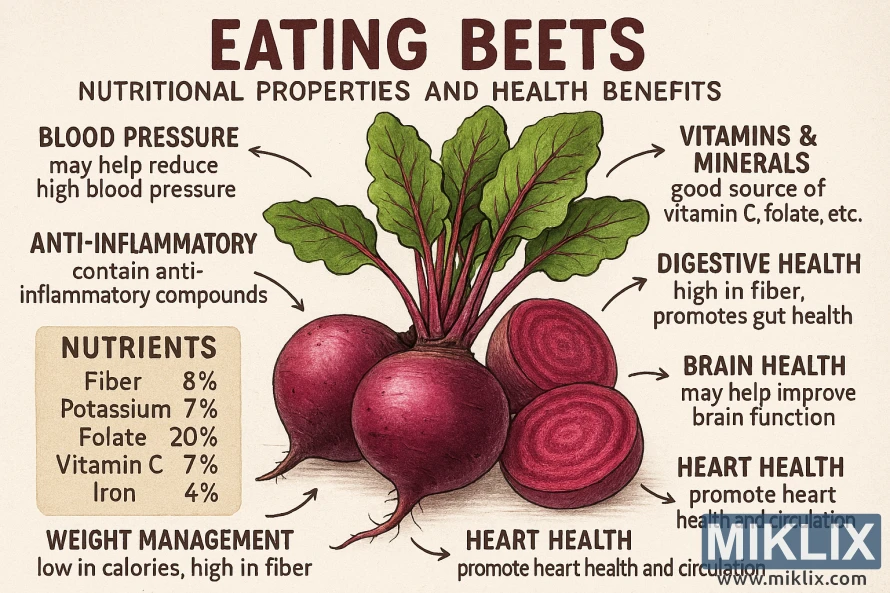
Enhancing Athletic Performance with Beets
Beets have become a favorite among athletes for their ability to boost physical performance. The secret is in the dietary nitrates they contain. These nitrates help cells use oxygen better during exercise.
This leads to improved endurance and overall performance. Athletes see a big difference in their abilities.
Studies show that beetroot juice is great for cycling and running. Many athletes drink it before competitions to get the most out of their performance. Beets do more than just increase endurance. They also make workouts feel less hard.
Adding beets to your diet is easy. You can drink beet juice before working out or eat roasted beets after. This natural way helps athletes reach their fitness goals and enjoy the health benefits of beets.
Beets May Help Fight Inflammation
Beets are more than just a colorful addition to your meals. They have amazing anti-inflammatory properties. These vibrant root vegetables contain betalains, which are pigments known for their strong anti-inflammatory effects. Studies have shown that drinking beetroot juice can lower inflammation markers in the body.
This is important because it helps prevent chronic diseases like obesity and heart disease.
Adding beets to your diet can be a smart move against chronic inflammation. The anti-inflammatory properties of beets help support the body's natural defense. By tackling inflammation at its source, beets can help reduce the risks of various chronic health issues.
Improving Digestive Health with Beets
Beets are great for your digestive health. They are full of dietary fiber, which is good for your gut. One cup of beets has about 3.4 grams of fiber. This helps you go to the bathroom regularly and avoid constipation.
Beets do more than just help with digestion. The fiber in them helps good bacteria in your gut. Eating enough fiber can also lower the risk of chronic diseases. So, adding beets to your diet is a smart move.
Adding beets to your meals is easy and effective. They are sweet and colorful, making your food look and taste better. You can roast, pickle, or blend them into smoothies. Beets are good for your taste buds and your digestive system.
Supporting Brain Health Through Beet Consumption
Beets are more than just a colorful addition to your plate; they play a significant role in supporting brain health. The nitrates found in beets improve blood flow to the brain, boosting various cognitive functions. This can lead to better decision-making and quicker reaction times, which are essential for everyday activities.
Research shows that regular consumption of beet juice may positively affect cognitive health. As the brain gets more oxygen and nutrients, mental clarity improves. This may help reduce the risk of neurodegenerative disorders, including dementia.
Incorporating beets into your diet can be a delicious way to nourish your mind. Whether added to salads, smoothies, or soups, beets offer great flavors and health benefits. A simple addition may pave the way for a sharper, healthier brain.
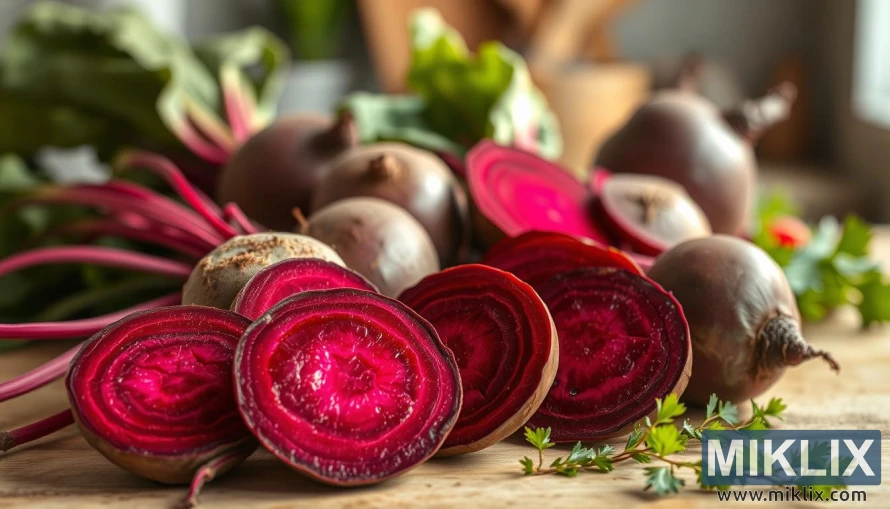
Potential Anti-Cancer Properties of Beets
Beets have caught the eye of health experts for their possible role in fighting cancer. They contain compounds like betaine and ferulic acid, which show promise in battling cancer. Studies suggest these might help slow down cancer cell growth, sparking hope for more research.
Studies on beetroot extracts hint at their ability to stop cancer cells from multiplying. While the results are promising, more research is essential to grasp their full benefits. Beets' role as antioxidants is key, helping the body fight oxidative stress and boosting overall health.
Beets and Their Role in Energy Balance
Beets are a great choice for those trying to manage their weight. They are low in calories but high in water, making them very filling. This makes them a perfect food for keeping energy levels up without adding too many calories.
The fiber in beets helps you feel full longer. This means you can eat more without feeling too hungry. Adding beets to your meals can help you eat healthier and manage your weight better.
Delicious Ways to Incorporate Beets into Your Diet
Cooking with beets opens up a world of flavors and colors. These root vegetables can be prepared in many ways. This enhances both taste and nutrition. Here are some popular beet recipes and ideas:
- Roasted Beets: Roasting beets brings out their natural sweetness. It also adds a tender texture. They're perfect for salads or as a side dish.
- Beet Salads: Mix roasted beets with goat cheese, walnuts, and arugula. This makes a fresh and satisfying salad.
- Juiced Beets: Juicing beets lets you enjoy their health benefits in a refreshing drink. Try them with apples and ginger for a delicious blend.
- Beet Hummus: Blend cooked beets with chickpeas, tahini, and garlic. This creates a colorful and nutritious twist on traditional hummus.
- Borscht: This classic Eastern European soup has a hearty blend of beets, vegetables, and meat. It's a warming and nourishing dish.
These methods keep the nutritional value of beets while adding color and flavors to your meals. Enjoy experimenting with cooking beets and find new favorites!
How Beets Promote Heart Health
Eating beets regularly is good for your heart. They contain nitrates that help lower blood pressure. This is key for a healthy heart.
Nitrates in beets turn into nitric oxide in our bodies. This makes blood vessels relax and get wider. This improves blood flow.
Beets also have folate and potassium, which are good for the heart. Folate lowers homocysteine, a heart disease risk factor. Potassium keeps blood pressure in check and helps the heart work right.
Beets also improve blood circulation. Better blood flow means a more efficient heart and better oxygen delivery. Adding beets to your meals can help keep your heart healthy and lower heart disease risk.
The Importance of Fiber in Beets
Beets are a great source of dietary fiber, with about 3.4 grams per cup. This fiber is key for a healthy digestive system. Eating foods high in fiber helps with digestion and regular bowel movements.
Eating beets can bring many fiber benefits. It helps lower cholesterol, which can reduce heart disease risk. Also, a high-fiber diet may lower the risk of diabetes and some cancers.
Beets are a top choice for fiber. They add color and flavor to meals. Adding beets to salads, smoothies, or sides is a simple way to get more fiber.
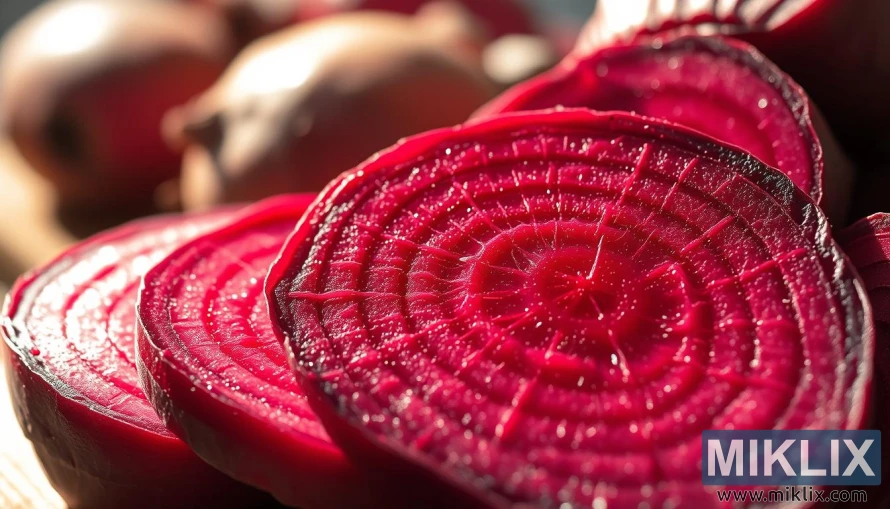
Are Beets Safe for Everyone?
Beets are a nutritious vegetable that many people can enjoy without issue. But, there are certain individuals who may face beets safety concerns. For example, people with kidney stones or gout might need to limit their intake because of the high oxalate levels found in beets. These compounds can contribute to the formation of stones in susceptible individuals.
It is essential to consider dietary restrictions of beets before incorporating them into meals. Those with compromised kidney function should approach beet consumption cautiously. The vegetable contains a significant amount of potassium. High potassium levels can exacerbate certain health conditions.
Ultimately, consulting a healthcare provider is advisable for anyone considering significant dietary changes, even if they have underlying health conditions. By doing so, individuals can enjoy the health benefits of beets while minimizing any risks.
Precautions When Adding Beets to Your Diet
When thinking about adding beets to your diet, it's key to know some possible issues. Eating too many beets can cause low blood pressure or stomach upset. If you have a sensitive stomach, eating beets in moderation can help avoid these problems.
Beeturia is a common concern. It's when your urine turns red after eating beets. While it might look scary, it's usually harmless. Knowing about this can help you make better choices about eating beets.
To keep your diet balanced, try eating different vegetables. This way, you get a variety of nutrients and avoid risks. It's a smart move for your health.
Conclusion
Beets are a powerhouse of health benefits, making them great for improving overall well-being. They help boost athletic performance and support heart, brain, and digestive health. This summary highlights how amazing these vibrant root vegetables are.
Adding beets to your diet brings color and essential nutrients to your meals. They're versatile in dishes like salads and smoothies. Enjoying beets regularly brings unique flavors and health benefits.
Adding beets to your meals is a tasty way to a healthier lifestyle. They have a great nutritional profile and many health benefits. Try them out and enjoy the wellness they bring!
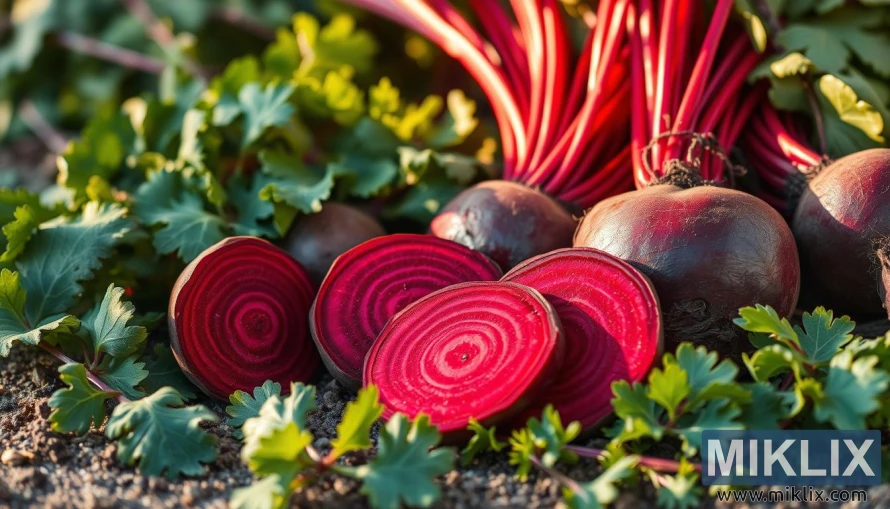
Further Reading
If you enjoyed this post, you may also like these suggestions:
- From Bean to Benefit: The Healthy Side of Coffee
- Tropical Treasure: Unlocking the Healing Powers of Coconuts
- Spice Up Your Life: How Chili Boosts Your Body and Brain
